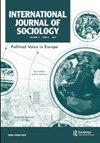Impact of the Industrial Revolution on Family Structure in Nigeria
IF 1.8
Q2 SOCIOLOGY
引用次数: 0
Abstract
Purpose: The study sought to analyze the impacts of industrial revolution on the family structure in Nigeria Methodology: The study adopted a desktop methodology. Desk research refers to secondary data or that which can be collected without fieldwork. Desk research is basically involved in collecting data from existing resources hence it is often considered a low cost technique as compared to field research, as the main cost is involved in executive’s time, telephone charges and directories. Thus, the study relied on already published studies, reports and statistics. This secondary data was easily accessed through the online journals and library. Findings: The results show that there has been a change of family structure since the pre industrialization era and the post industrialization era. The historical process of industrialization changed the ways in which families were structured and interacted. Family bonding are decreasing and divorce rate is increasing rapidly. These shift not only affected the roles of spouses and parents but also those of children. Industrialization changed gender roles and Enlightenment philosophies that inspired new ideals of equality, personal freedom, and individualism. Unique Contribution to Theory, Practice and Policy: The modernization theory, Talcott Parsons’ theory and the classic sociological theory may be used to anchor future studies in the sociology sector. The study results will also benefit other stakeholders such as the policy makers as well as researchers and scholars from different parts of the world. The top management of both public and private industries in the country will also use the study findings to improve families and ensure high and stable performance in all their activities and programs. The study recommends that the adoption of effective social protection development policies in the family structure will help to improve efficiency in their major operations and activities.工业革命对尼日利亚家庭结构的影响
目的:本研究旨在分析工业革命对尼日利亚家庭结构的影响。方法:本研究采用桌面方法。案头研究指的是二手数据或不需要实地调查就能收集到的数据。案头调查基本上涉及从现有资源中收集数据,因此,与实地调查相比,案头调查通常被认为是一种成本较低的技术,因为主要费用是行政人员的时间、电话费和通讯录。因此,这项研究依赖于已经发表的研究、报告和统计数据。这些二手数据很容易通过在线期刊和图书馆获得。研究发现:我国家庭结构在工业化前和后两个时期都发生了变化。工业化的历史进程改变了家庭的结构和互动方式。家庭联系正在减少,离婚率正在迅速上升。这种转变不仅影响了配偶和父母的角色,也影响了孩子的角色。工业化改变了性别角色,启蒙哲学激发了平等、个人自由和个人主义的新理想。对理论、实践和政策的独特贡献:现代化理论、塔尔科特·帕森斯的理论和经典的社会学理论可以用来锚定社会学领域未来的研究。研究结果也将使其他利益相关者受益,例如政策制定者以及来自世界各地的研究人员和学者。该国公共和私营企业的高层管理人员也将利用研究结果改善家庭,并确保其所有活动和计划的高稳定绩效。研究报告建议,在家庭结构中采取有效的社会保护发展政策将有助于提高其主要业务和活动的效率。
本文章由计算机程序翻译,如有差异,请以英文原文为准。
求助全文
约1分钟内获得全文
求助全文

 求助内容:
求助内容: 应助结果提醒方式:
应助结果提醒方式:


